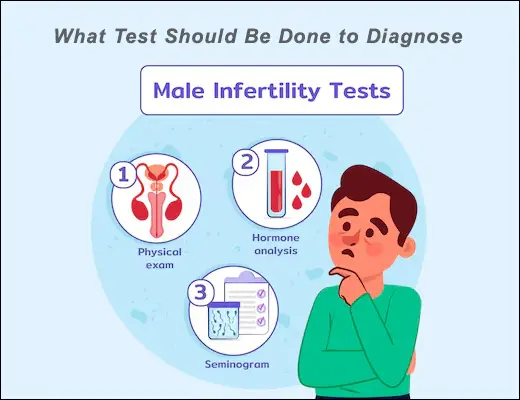Fertility test in males! Sperm count test at home!
Male fertility tests in Dubai
Male fertility tests are a series of medical tests aimed at assessing a man’s reproductive health and the ability to contribute to conception.
Get insight into the various tests available for evaluating male infertility. We at Medilife offer you the tests at your doorstep.

What is Male Infertility?
Male infertility is a condition that affects men. It interferes with the ability of their reproductive system to impregnate a female. Male infertility means even after you have repeated unprotected sexual intercourse for 6 months to over a year, your female partner doesn’t get pregnant.
The factors contributing to male infertility are complex. There are several causes, which include physical, genetic, hormonal, and environmental factors.
What causes Male Infertility?
Many biological and environmental factors can cause male infertility. These include:
⦁ Sperm problems, including malformed sperm, low sperm count (oligospermia) and the absence of sperm in your semen (azoospermia).
⦁ Genetic disorders, including Klinefelter syndrome and myotonic dystrophy.
⦁ Chronic medical conditions, including diabetes,autoimmune diseases that attack your sperm and cystic fibrosis.
⦁ Infections, including epididymitis, orchitis and sexually transmitted infections (STIs), including gonorrhea or HIV.
⦁ Swollen veins in your testicles (varicoceles).
⦁ Cancer treatments, including chemotherapy, radiation therapy or surgical removal of your testicles (orchiectomy).
⦁ Testicular trauma.
⦁ Hormonal disorders that affect your hypothalamus or pituitary glands.
Symptoms and signs of male infertility:
General symptoms and signs include:
- Reduced sexual desire.
- Erectile dysfunction
- Premature or absence of ejaculation
- Pain or swelling in the testicular area.
Hormonal symptoms may include:
- Reduced muscle mass
- Fatigue
- Depression or mood swings
- Difficult to concentrate.
When to suspect male infertility?
The infertility in a male can be doubted if:
- Inability to impregnate the partner even after 6-12 months of unprotected sex.
- The female partner has been evaluated and found normal.
- History of testicular trauma, mumps, surgery, or infections (e.g., STIs).
- Use of anabolic steroids or certain medications.
- Chronic exposure to environmental toxins, including lead, calcium, pesticides, or mercury.
- Exposure to chemotherapy or radiation.

1. Semen Analysis: The primary test to evaluate sperm count, motility, and morphology. It helps determine the quality of sperm.
2. Hormonal Testing: Evaluates levels of testosterone and other hormones that regulate sperm production.
3. Scrotal Ultrasound: Detects physical abnormalities, such as varicoceles, that can affect sperm production.
4. Genetic Testing: Sometimes recommended if sperm production is severely impaired to check for chromosomal abnormalities.
Hormonal tests for male infertility:
Hormonal testing is crucial in evaluating male infertility, as hormones regulate sperm production and sexual function. Here are some common hormonal tests and their significance:
- FSH (Follicle Stimulating Hormone): stimulates sperm production in the testes.
- LH (Luteinizing Hormone): stimulates testosterone production in the testes.
- Testosterone: The main male sex hormone responsible for sperm production and libido.
- Prolactin: While typically linked with lactation in females, high prolactin in males can disrupt fertility by inhibiting GnRH (gonadotropin-releasing hormone).
- Estradiol (E2): Although it’s a female hormone, estradiol plays a role in male reproductive health.
- SHBG (Sex Hormone-Binding Globulin): binds to testosterone, affecting its availability.
High or low levels can alter the bioavailability of testosterone, impacting fertility. - Inhibin B: A marker of spermatogenic (sperm production) activity in the testes.
Low levels often indicate impaired sperm production. - GnRH (Gonadotropin-Releasing Hormone): Stimulation Test: Assesses the hypothalamus’s and pituitary’s ability to release LH and FSH.
This test is less commonly used but may be necessary if secondary (central) hypogonadism is suspected.
scrotal ultrasound! fertility tests for males in dubai!
Scrotal ultrasound:
Scrotal ultrasound is a valuable diagnostic tool in the evaluation of male infertility. It is a non-invasive imaging technique which gives images of the scrotum and the structures within it, including the testes, epididymis, and surrounding tissues.
Helpful in assessing:
⦁ Testicular Volume and Size
⦁ Evaluation of Varicocele: Varicoceles are enlarged veins within the scrotum.
⦁ Epididymal Issues: To evaluate epididymitis or obstructions that can affect sperm transport.
⦁ Testicular Masses: To identify and characterize any masses or lesions, such as tumors, that could impact fertility.
⦁ Assessment of Trauma: In cases of injury to the scrotum or testicles, ultrasound can evaluate the extent of damage.
⦁ Congenital Anomalies: To detect conditions such as undescended testes (cryptorchidism) or other developmental abnormalities.

Male infertility testing at home in dubai! Sperm DNA fragmentation test at home in dubai!
Common inquiries regarding male infertily and tests
Male infertility is a term that refers to a man’s inability to impregnate a fertile female partner even after unprotected sex for 6- 12 months.
The causes of male infertility are complex, it can be due to abnormalities in semen quantity, sperm production, genital diseases, chronic disease, exposure to toxins, chemicals, pesticides, hormonal imbalance and testicular disorders.
If pregnancy has not occured after 12 months of unprotected sex and the female partner has been evaluated and found normal.
The infertility in males can be due to various reasons; it may include:
- Genital infections like STDs.
- Hormonal imbalance
- Smoking, alcohol consumption, and exposure to illicit drugs.
- Chronic diseases like diabetes.
- Exposure to toxins, pesticides, and chemicals.
- Exposure to radiation and chemotherapy.
A semen analysis is the initial and most important test done to evaluate sperm count,motility, morphology and volume.
- Hormonal blood tests: FSH, LH, testosterone, prolactin, estradiol, SHBG, and inhibin B.
- Sperm DNA fragmentation test.
- Post-ejaculatory urine test (for retrograde ejaculation).
- Anti-sperm antibodies
- Scrotal ultrasound
- Genetic testing (y chromosome microdeletion)
Yes, stress, obesity and poor diet and habits can lower testosterone and sperm quality.
- Smoking reduces sperm counts and sperm motility and increases the number of abnormally shaped sperm, thus contributing to fertility issues.
- Cigarette toxin leads to sperm DNA fragmentation, leading to infertility, miscarriage, or birth defects.
- Nicotine in smoke causes constriction of blood vessels, leading to reduced blood flow in the penis, leading to erectile dysfunction.
- Smoking in women leads to damage in ovaries, reduces egg quality and number.
- Increases risk of ectopic pregnancy (tubal), due to impaired motility function of fallopian tubes.
- Nicotine affects levels of estrogen, making conception difficult.
- Smoking causes placental damage and reduced oxygen supply, leading to pregnancy loss.
